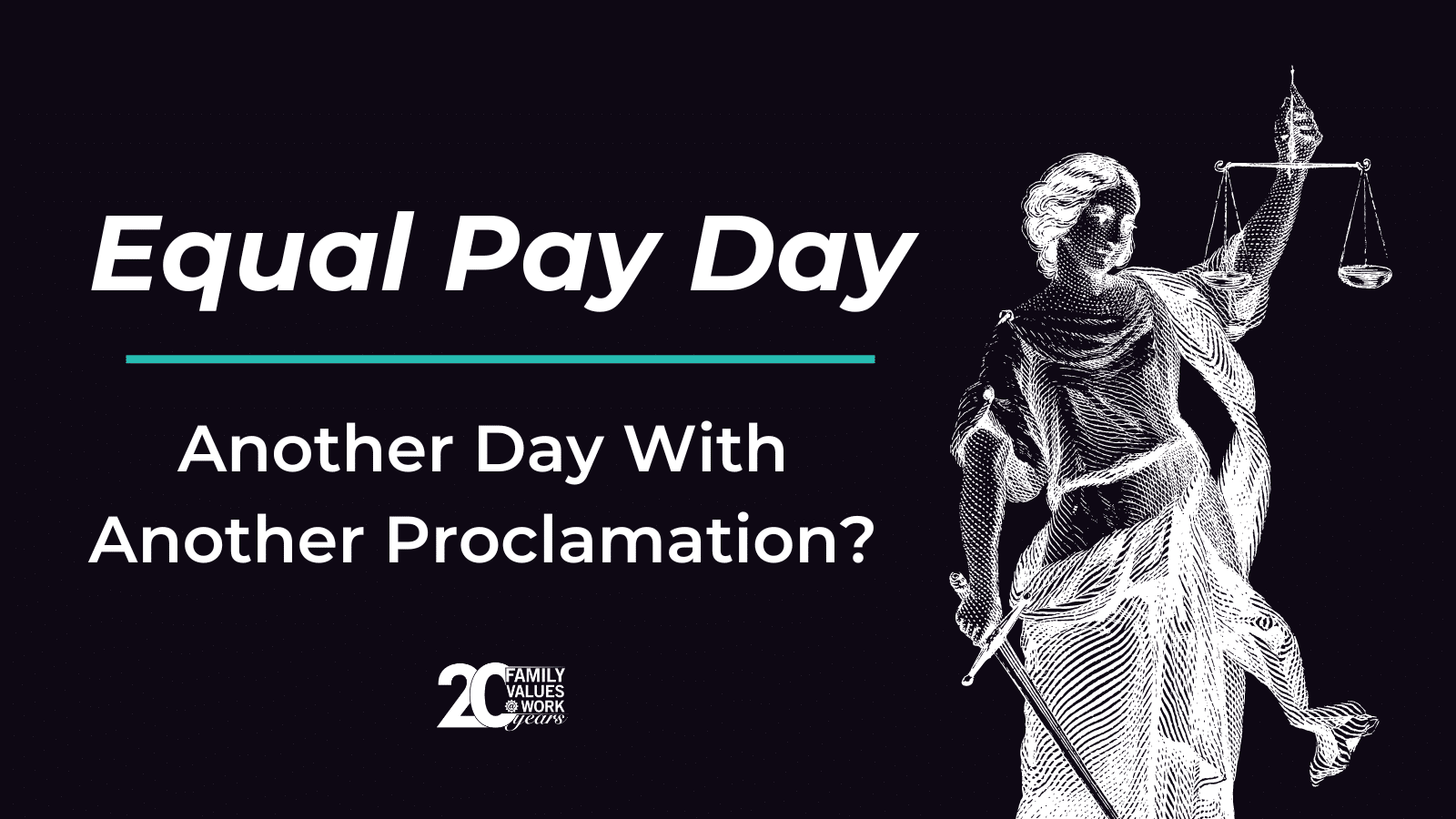National Pay Equity Day – Another Day With Another Proclamation?

By Family Values @ Work Executive Director Josephine Kalipeni
March 14th was Equal Pay Day, the day that symbolizes how far into the year women must work to earn what men earned the year before. Currently, women are paid 84 cents for every dollar men earn. Black women currently earn 58 cents for every dollar, and Latinas earn 57 cents for every dollar. This is absent of an analysis that takes into account what it means for the wages of caregiving working women of color who are also disabled. For women of color, Equal Pay Day is much later in the year. Still, this day makes it painfully clear that women must work for nearly fifteen months to make what men make in twelve months.
At Family Values at Work, we advocate, organize and strategize to win paid family leave and paid safe days at the state level and, ultimately, at the federal level. Whether formally or informally, women are largely responsible for caregiving, especially women of color, even as they work full-time jobs. March marked the 30-year anniversary of the Family and Medical Leave Act (FMLA). FMLA protects workers’ jobs by granting up to 12 weeks of unpaid leave to recover from a serious illness or to care for a family member. Only workers who have been at their jobs for over a year at companies with over 50 employees are covered. Women of color are more likely to work at jobs that are not covered by the FMLA.
While the United States is the only developed country that doesn’t have a national mandate for paid leave at the national level, 11 states and the District of Columbia have boldly moved to offer paid leave to their workers. When leave is paid, it offers a percentage of one’s base wages. When the reimbursement rate is too low, workers cannot afford to take the time off. And, women of color are less likely to have access to paid leave, sometimes even in states that offer it. Why? Because the women who are more likely to need time off are also on the lower ends of worker pay scales. But when we’re already underpaid, we cannot afford to take unpaid time off or paid time off that is not adequately compensated, even as the caregiving demands fall largely on us.
And many of us have family members who aren’t even recognized as “family” by law in many states. LGBTQ+ communities have taught us that family means more than just blood. We can’t get time off to care because some states don’t recognize our family connections.
The link between paid leave and pay equity is clear. Women are at the intersection of all of the detrimental impacts. Women are most heavily impacted by gender and occupational segregation and are often in the fastest-growing industries that are also the lowest-paid jobs. Women are paid less than their male counterparts. All while a majority of caregiving demands fall on women. All of these impacts are policy choices. All this means that when women can no longer put off the care of themselves or a loved one, it will be unpaid and, likely, unrecognized and undervalued. The choices are harsh. Either one neglects a loved one or risks financial devastation by taking time off.
We need paid leave and we need equal pay. And pay equity cannot be where the conversation ends. While equity is a key step toward justice and fairness, equalizing women’s pay to men’s pay when wages are already too low for most workers is not enough. Wages must be increased – not to a living wage, but to a family-sustaining wage indexed to inflation and the cost of living.
The White House issued a proclamation for National Pay Equity Day. The proclamation acknowledges that the gaps in pay for women are a combination of discrimination and the fact that women are concentrated into lower-paying jobs and industries that also often lack meaningful, usable benefits. The proclamation also recognizes the link between pay gaps and paid leave. “We also have to get more families the support needed for both women and men to lead full careers — including paid family and medical leave and affordable child, elder, and home care so no one in this country is ever again forced to choose between the job they need and the family they love.”
While we are pleased that this connection is evident to the Biden Administration, it will take all of us demanding equal pay, increased pay, and worker benefits like paid family and medical leave. The working poor should not be a category that exists in the wealthiest country in the world. We have to make these demands loud and clear in every chamber of power. If this administration truly wants to avoid the cruelty of having women workers decide between their jobs and their families, then it must wield every power available to it to enact executive orders and legislation that change the future trajectory of working caregiving women. Otherwise, National Pay Equity Day is simply another day with another proclamation.